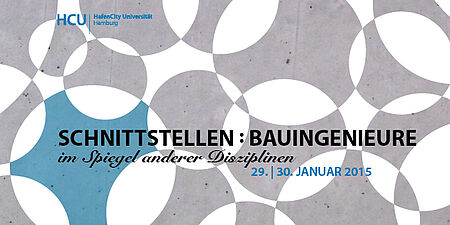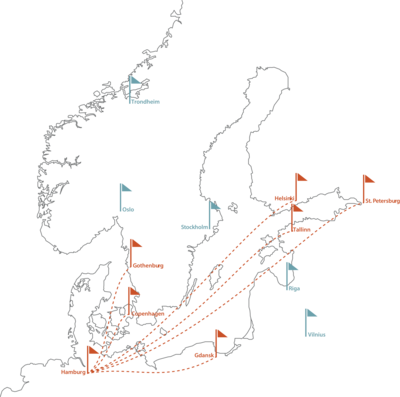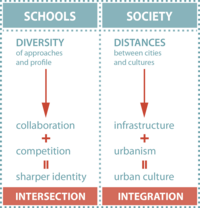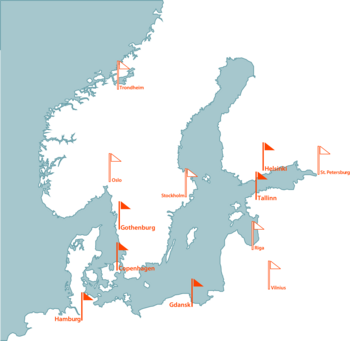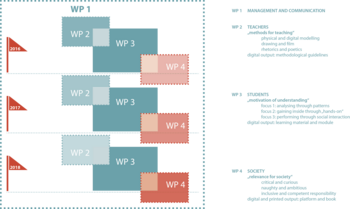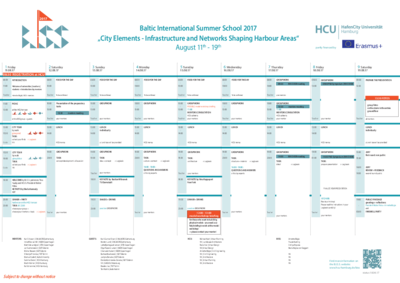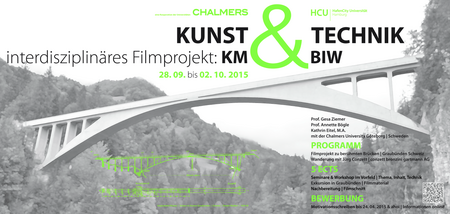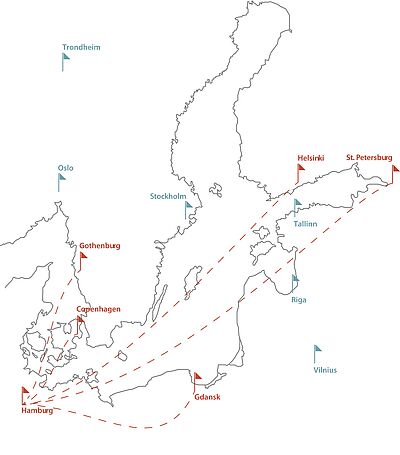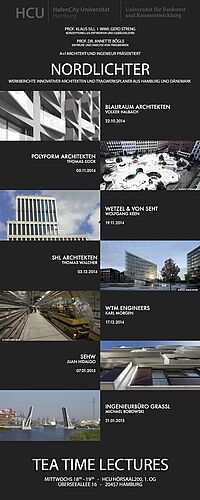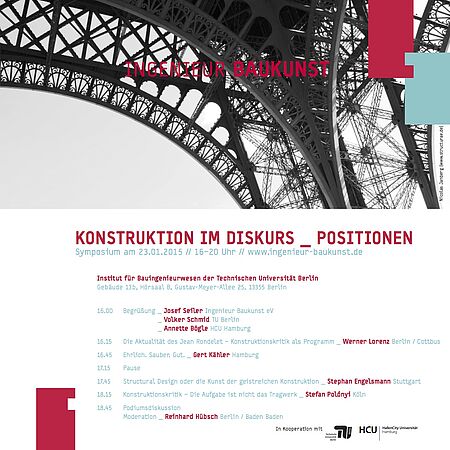ARCHIV
B.I.S.S. Baltic International Summer School 2018

The fourth Baltic International Summer School 2018 (B.I.S.S.) at the HCU in Hamburg takes part in a continuous academic exchange between disciplines of the built environment and presents a broader perspective on education and practice in the context of interdisciplinarity and interculturallity.
The B.I.S.S. focusses on the collaboration between architects and engineers and related disciplines as urban design, urban planning, metropolitan culture and performing arts. In addition to the work in small interdisciplinary and internationally mixed groups, several public lectures and discussions with well-known experts, as well as guests from politics and public will take place during the nine-day workshop.
The summer school has been taking place at the HCU for the last three years bringing together participants from the leading universities in the Baltic Sea Region: from Denmark, Sweden, Finland, Poland, Estonia, Latvia, Russia and Germany. This year´s edition of the B.I.S.S. is the final one to be organized in Hamburg and it is going to be documented as a short film.
The motto „think the link“ indicates the interdisciplinary approach searching for ties and correlation between experiences, cultures, cities and objects of the built environment. The area east of Hamburg`s city center, in particular around the high-speed infrastructural joint „Billhorner Brückenstraße / Billhorner Röhrendamm“ will be the stage for the topic 2018 “Beyond Urban Flows - Architecture and Engineering for Transition Places”.
The project groups are asked to deal with the development of this specific area with a high importance for Hamburg: entrance to the city and at the same time a high density of major infrastructural elements. The main questions to be addressed here are how such transition places can be re-shaped, in a mid and long-term perspective, in order to bring to them more inner-city life qualities; how this area can become more attractive to pedestrians; how borders and limitations can be overcome? Within the workshop potentials and effects will be explored on all four levels: technical, functional, aesthetical and social. Thus, not only challenges typical for Hamburg will be addressed, but also parallels and the transferability of solutions to the other harbor cities from the Baltic Sea Region will be sought.
Within the project a wide range of disciplinary and thematic focusses shall be possible. Discovery and trial of methodology of the participating disciplines in their creative work will be background and source of the Summer School.
Joint identification of the existing problems, examination of various methods and elaboration of possible solutions will strengthen the cross-functional competences of planners and designers in built environment referring to their different academic and cultural background.
The duration of the Summer School is 9 days.
Friday 10. 08. – Saturday 18. 08. 2018
The workshop will manly take place in the premises of the HCU. The framework will provide keynote lectures on Friday the 10th, Sunday the 12th and Tuesday the 14th of August as well as a big public final presentation and party on Saturday the 18th of August.
For HCU students
Last seats are available - apply NOW!
· Aalto University, Helsinki, Finland
· Chalmers University of Technology, Gothenburg, Sweden
· Royal Academy of Fine Arts Copenhagen, Denmark
· Technical University of Denmark, Copenhagen, Denmark
· Gdansk University of Technology, Gdansk, Poland
· Tallinn University of Technology, Tallinn, Estonia
· ITMO University, Saint Petersburg, Russia
· Saint Petersburg state university of architecture and
civil engineering, Saint Petersburg, Russia
· HafenCity University Hamburg, Germany
Prospectively more universities from the Baltic Sea Region will join the B.I.S.S. in the future.
About 65 students, 7-8 students per university will participate in the Third B.I.S.S., so that both the disciplines and the participating universities are equally represented.
The Baltic International Summer School focuses on the interface of disciplines of the built environment as architecture, civil and structural engineering, urban planning and design and other related disciplines. The B.I.S.S. is designed for students preferably at Master’s level. Nevertheless students at Bachelor’s and PhD level can also submit their applications.
In order to follow the lectures, work in multinational groups and participate actively in the discussions, students should have a good command of the English language.
A continuous scientific, organizational and cultural exchange will be ensured by working in small interdisciplinary and international teams. Several formats are going to be applied:
· keynotes: Thematic impulses will be given by a number of
well-known experts.
· mentoring system: The whole group of students will be
divided in work groups of 10-16 students each guided by
one teacher. Within these groups, smaller working groups
of 4 students will be constituted.
· input: Regular inputs by one of the participating professors
will open up a work day.
· group work: Students will work on their project in groups
of 4 following their own thematic focus.
Small excursions will complement the studies.
· presentation: Presentations will be commented by a number
of present experts.
· guest critics: Critics by external experts from different
disciplines will promote the work flow.
· final public presentation: Guests from the press, the politics
and local and international experts as well as participating
teachers will comment the projects on Saturday the
19th of August. It will be open to the public and followed
by a farewell party.
Furthermore a special social program will be organized, where participants from different countries and disciplines can meet and have a great time together. Including welcome reception, thematic city walk, a picnic at the start and a farewell party at the end. The city tour, developed by HCU students will show the City, remarkable buildings and structures and give a good overview about Hamburg, the HafenCity and the University itself.
We are happy to present following lectures by inspiring protagonists and their individual point of view on the intersection of architecture and engineering.
HafenCity University . Hörsaal 200 . 6:30 pm
Fri . August 21
Neil Thomas . atelier one . www.atelierone.com
Sun . August 23 NN
Tue . August 25
Mike Schlaich . schlaich, bergermann und partner, Berlin
www.sbp.de
Hamburg`s University of the Built Environment has installed a network of researchers, teachers and students from the Baltic Sea Region. With this year`s focus „at - over - on the water“ 65 students from eight renowned universities create social and urban links of two of Hamburg`s most developing districts - HafenCity and Rothenburgsort. Hence links not only emerge between districts and cities but also between countries and cultures in the Baltic Sea Region. The results ranging from artistic to architectural and engineering concepts are presented to an invited audience at the Finissage in presence of the B.I.S.S. patroness Katharina Fegebank , Second Mayor of the City of Hamburg and Senator for Science, Research and Equalities.
closing event of the 1. B.I.S.S. on Saturday, August 29, 2015.
6:00 pm reception
welcome by the President of the HCU Dr.-Ing. Walter Pelka
and greetings from the B.I.S.S. patroness
Katharina Fegebank
Second Mayor of the City of Hamburg
and Senator for Science, Research and Equalities
as well as reflections of the Summer School by
Prof. Dr.-Ing. Annette Bögle
8:00 pm buffet on the terrace of the HCU
start of the unofficial framework programme
8:00 pm - 9:00 pm exhibition of the results
public tours led by B.I.S.S. supervisors
9:30 pm - 2:30 am party
with drinks and music
The participation at the Baltic International Summer School does not have any registration fee for the students from BeInterBaltic partner universities. Students from invited guest universities pay a participation fee of 450 €.
The workshop includes accommodation for ten nights, one daily meal as well as the workshop with guest lectures, course material and access to IT facilities and the HCU workshop. Furthermore, we will cover the costs of public transportation in Hamburg and a number of social activities during the whole Summer School. A contingency of rooms is reserved at the youth hostel.
Student workload at the B.I.S.S. including the preparation and documentation of the Summer School will be expressed in 5 ECTS credits. The workload will be ensured by the workshop in addition with preparation and postprocessing at the home universities. Besides the ECTS credits, students will be awarded a certificate of attendance for actively participating and successfully completing all assignments during the Baltic International Summer School.
Maria J. Mujica von Seggern | B.Sc. Architecture
maria.seggern@hcu-hamburg.de
+49 (0)40 | 42827-5234
Emiliya Popova | M.Sc. Urban Design
emiliya.popova@hcu-hamburg.de
+49 (0)40 | 42827-5236
Prof. Dr.-Ing. Annette Bögle
Design and Analysis of Structures
Civil Engineering | Architectural Engineering
annette.boegle(at)hcu-hamburg.de
if you have any questions you can contact either us or the responsible teacher at your home university:
Aalto University, Helsinki | Toni Kotnik
Chalmers University, Gothenburg | Morten Lund
Royal Academy of Fine Arts, Copenhagen | Olga Popovic Larsen
Technical University of Denmark, Copenhagen | Lotte Bjerregård Jensen
Gdansk University of Technology, Gdansk | Bartosz Macikowski
Tallinn University of Technology, Tallinn | Roode Liias
The professional reality is really interdisciplinary!
When city transformation and evolution starts, what are the tools for successful strategies for urban interventions? How is the digital planning to digital fabrication process? How engage are the new professionals? And how could this influence the future of the bridge design?
These and other questions were analyzed by more than 60 students representing various disciplines of built environment and working together in international and interdisciplinary mixed project groups within the fourth Baltic International School (B.I.S.S.) – “think the link”. The B.I.S.S. launched by the HafenCity University Hamburg together with eight international partner universities from the Baltic Sea region aims to develop, test and implement new ways of the interdisciplinary teaching, learning and designing as well as search for ties and correlations between experiences, cultures, cities, in particular around the high-speed infrastructural joint "Billhorner Brückenstraße / Billhorner Röhrendamm", will be the stage for the topic "Beyond Urban Flows - Architecture and Engineering for Transition Places".
This publication serves as a source book for fresh and unconventional urban development and intervention in harbor cities as well as an inspiration for successful interdisciplinary working, teaching and learning. On top, it gives a full documentation of the B.I.S.S. and expert comments on the 15 interdisciplinary projects that were designed during the ten day workshop in Hamburg in 2016.
Find the BISS 2015 Book here on the pages of our library.
Find the BISS 2016 Book here on the pages of our library.
BeInterBaltic

The project "Intersections in built environment: promoting interdisciplinary higher education in the Baltic Sea Region (BeInterBaltic)" is an international cooperation project funded within the ERASMUS+ programme of strategic partnerships and coordinated by the Hafencity University Hamburg. It has duration of three years (2015-2018) and aims to enhance the quality and relevance of higher education in Baltic Sea Region by improving and adapting the current curricula of built environment disciplines of participating universities.
The thematic approach of the project BeInterBaltic focuses the COMPEXITY of current urban conditions, actual chances and challenges; the traditional division of disciplines is no longer adequate. For example too often engineering focuses only on technical-economic aspects and architecture only on the aesthetical artistic ones, thus the holistic approach is neglected. Also many major projects struggle, like the new railway station for Stuttgart 21 or the philharmonics in Hamburg. Among others part of the problem is that mistakes are quite often detected too late and responsibilities are hard to define and assign.
Thus this COMPLEXITY requires cooperation and understanding between the disciplines. The basic for these needs to be implemented in education and a new TEACHING MODULE in higher education of built environment becomes essential. Also individual disciplines do not have the necessary capacity to develop the comprehensive understanding alone therefore interdisciplinary approaches are needed in order to frame and address the complexity of the praxis of contemporary built environment in general and the intersection between architecture and engineering in particular.
The project BeInterBaltic aims:
(1) to develop and test new teaching methods and formats,
(2) to equip the students with the interdisciplinary and intercultural competences and skills,
(3) to strengthen an interactive dialogue between the universities and non-academic sector and
(4) to promote and increase the cooperation between the universities in Baltic Sea Region.
The project consortium consists of 7 higher education institutions from six countries:
• HafenCity University Hamburg, DE (Project Coordinator)
• Gdansk University of Technology, PL
• Tallinn University of Technology, EE
• The Royal Danish Academy of Fine Arts, DK
• Technical University of Denmark, DK
• Chalmers University of Technology, SE
• Aalto University, FI
The project BeInterBaltic is structured in four interlinked and parallel progressing work packages (WPs).
Within the WP1 successful project implementation and dissemination of the project outcomes will be ensures.
The aim of the WP2 is to bring the teachers of disciplines of built environment together in order to evaluate existing and develop new methods as well as formats of interdisciplinary teaching. These methods and formats will include (1) physical and digital modelling, (2) drawing and film and (3) rhetorics and poetics, all of them focusing on chances and challenges of the build environment. Within this WP a workshop for teachers will be conducted and methodological guidelines for teachers will be developed.
WP3 includes a paradigm shift from the methods of teaching towards the students and their motivation of understanding. To intensify these motivation different aspects of designing in the context of the build environment and at the intersection of the disciplines will be applied: (1) analysing through patterns, (2) gaining insides through “hands-on” and (3) performing through social interaction. These aspects depend on another and develop the examination of the relationship between the designer and the design. Each of these steps will be addressed in one of the three summer schools which are the core activity in this WP. Within this WP the teaching material for a new teaching module will be jointly developed.
The AIM of WP 4 is to point out the relevance of this interdisciplinary project for society. To meet the requirements of society students need to have (1) a critical and curious mind-set, (2) a naughty and ambitious attitude and (3) an inclusive and competent responsibility. The output of the WP4 is to create a digital platform for the interdisciplinary and intercultural exchange between the students, teaching staff, industry as well as other stakeholders from non-university society. For that purpose a thematic cluster “Intersections of Built Environment in Baltic Sea Region” will be developed. The cluster will serve to all project target groups and strengthen the active cooperation between universities and countries. Furthermore the cluster will support mobility, joint teaching and research activities as well as provide new research topics. A multiplier event in Tallinn is going to be organized in order to disseminate the project outputs and to promote stronger dialogue between the academic and non-academic society.
For more information:
M.Sc. Emiliya Popova
emiliya.popova(at)hcu-hamburg.de
+49 (0)40 42827 5236
Prof. Dr.-Ing. Annette Bögle
Design and Analysis of Structures
Civil Engineering | Architectural Engineering
annette.boegle@hcu-hamburg.de
Thema
Großprojekte als Innovationstreiber in der Bauwirtschaft
Laufzeit: 06/2017-11/2020
Mittelgeber: Freie und Hansestadt Hamburg, Landesforschungsförderung
Projektpartner:
Prof. Dr. Gernot Grabher, Arbeitsgebiet Stadt und Regionalökonomie, HCU (Sprecher)
Dr. Joachim Thiel, Arbeitsgebiet Stadt und Regionalökonomie, HCU (Koordination)
Prof. Dr. Monika Grubbauer, Arbeitsgebiet Geschichte und Theorie der Stadt, HCU
Prof. Dr. Annette Bögle, Arbeitsgebiet Entwurf und Analyse von Tragwerken, HCU
Prof. Dr. Cornelius Herstatt, Institut für Technologie- und Innovationsmanagement, TU Hamburg
Projektbearbeitung: Johanna Ruge
Große Bauprojekte haben in jüngerer Zeit vor allem als Misserfolge Beachtung erlangt. Gleichzeitig setzen sie aufgrund ihrer Komplexität in vielen Fällen, und häufig sogar unabhängig von ihrem ökonomischen Erfolg, neue technische und organisationale Standards und können die Verbreitung von Innovationen befördern. Das Forschungsprojekt beleuchtet diese weitgehend unbeachtete Seite von Großprojekten als Innovationstreiber in der Bauwirtschaft. Innovationen in der Bauwirtschaft entstehen, so die Ausgangsthese des Projekts, durch das Zusammenspiel von Kundenansprüchen, gestalterischem Ehrgeiz, den technischen Anforderungen des Bauwerks und der organisationalen Integration im Projekt. Ziel ist es anhand von sechs Fallstudien und unter Verschränkung sozialwissenschaftlicher mit ingenieurwissenschaftlicher Perspektive zu entschlüsseln, wie die genannten Faktoren zusammenwirken. In dem vom Arbeitsgebiet Entwurf und Analyse von Tragwerken bearbeiteten Teilprojekt wird insbesondere der Entstehungprozess von technischen Innovationen und deren Verknüpfung zum Projektzyklus untersucht.
PhD Symposium
Interfaces in the Built Environment. Bridging Technology and Culture in the Baltic Sea Region
PhD Symposium at the HafenCity University, Monday 16 April 2018
Abstract Submission: 19.02.2018
Notification of Acceptance: 09.03.2018
Full Paper Submission: 06.04.2018
The symposium provides a forum for PhD students and reserachers who are working in all fields of science related to the built environment and are interested in presenting their work to an interdisciplinary audience of experienced researchers from the Baltic Sea Region. The focus of the symposium is on innovation through interdisciplinary collaboration in the process of designing and developing of the built environment. Its aim is to support interdisciplinary and international communication between young scientists to facilitate collaborative research, networking, and knowledge transfer on the interdisciplinary research within the disciplines of the built environment.
Participants are highly encouraged to reflect on their work from an interdisciplinary perspective. This includes a reflection on their research question as well as on their methodology in the context of the interdisciplinary scientific research. The potential of the research outcomes for further interdisciplinary collaboration or the potential of the used methodology for further implementation in interdisciplinary context should be identified and specifically addressed in the submitted abstract.
The parallel sessions serve as a discussion platform with individual presentations and allow for constructive feedback and interaction between the young researchers and the experienced ones. The symposium will be opened by a keynote lecture and will be closed with a plenary discussion.
Accepted papers will be distributed to the conference attendees and will be peer-reviewed after the symposium. There will be a digital conference publication with an ISBN number (conference proceedings). Further pbulication opportunities are in negotiation and will be announced soon.
Application Procedure
Abstract Submission: 19.02.2018
--> See Eligibility and Submission Guidelines
Notification of Acceptance: 09.03.2018
Full Paper Submission: 06.04.2018
--> See Eligibility and Submission Guidelines
Paper Review Feedback: 01.05.2018
Revised Paper Submission: 29.05.2018
Eligibility and Submission Guidelines:
The symposium is open to early stage researchers, advanced and post-doctoral students, interested in research collaboration with the countries of the Baltic Sea Region.
Criteria for the submitted abstracts:
The topic should have a technical, social or environmental background related to the built environment, which:
1) Is reflected in the context of interdisciplinary research.
2) Explores the potential for further interdisciplinary collaboration.
3) Explores the potential for the transferability of the applied methodology to other research fields, which address issues of the built environment.
Submitted abstracts must not exceed 500 (five hundred) words, including the bibliography.
A short CV with all relevant qualifications and experiences must be also attached to the application.
Please submit the abstracts until 19 February 2018 to the following web page: https://easychair.org/conferences/?conf=innobsr2018.
Criteria for the submitted full papers:
Symposium papers must not exceed 8 (eight) pages, including the bibliography and any appendix. A template will be provided.
Please submit the full papers (if abstract is accepted) until 06 April 2018 tp the following web page: https://easychair.org/conferences/?conf=innobsr2018.
INTERDISCIPLINARY Scientific Committee
Annette Bögle, HafenCity University Hamburg, Hamburg
Olga Popovic Larsen, Royal Academy of Fine Arts, Copenhagen
Lotte Bjerregaard Jensen, Denmark Technical University, Copenhagen
Bartek Macikowski, Gdansk University of Technology, Gdansk
Justyna Borucka, Gdansk University of Technology, Gdansk
Dorota Kamrowska-Zaluska, Gdansk University of Technology, Gdansk
Toni Kotnik, Aalto University, Helsinki
Karl-Gunnar Olsson, Chalmers University of Technology
Anna Kaczorowska, Chalmers University of Technology
Preliminary program:
08:30 – 9:00 Registration
09:00 – 10:30 Plenary opening session + Keynote Lecture
11:00 – 13:00 Parallel sessions
13:00 – 14:30 Lunch
14:30 – 16:30 Parallel sessions
17:00 – 18:30 Plenary closing session
19:00 – open end Social Networking
Registration and Costs:
There is no participation fee for the PhD Symposium.
Meals during the event will be provided by the organizers.
Costs for accommodation (two-night stay) can be covered only for participants from the following countries: Poland, Latvia, Lithuania, Estonia.
Travel costs will not be covered and must be paid by the participants themselves.
Number of selected participants: up to 25 participants
Organisation and Contact Details:
The organizing committee can be reached via:
--> Prof. Annette Bögle, Annette.boegle(at)hcu-hamburg.de
--> Emiliya Popova, Emiliya.popova(at)hcu-hamburg.de
HafenCity University
Analysis and Design of Structures (Prof. Bögle)
Überseeallee 16
20457 Hamburg
B.I.S.S. Baltic International Summer School 2017

The third Baltic International Summer School 2017 (B.I.S.S.) at the HCU in Hamburg aims at a continuous academic exchange and presents a broader perspective on education and practice in the context of disciplines of built environment. The B.I.S.S. 2017 is a part of the project BeInterBaltic which is implemented within the ERASMUS+ program strategic partnerships.
By using common resources in the Baltic Sea Region pro t will be gained on several levels:
- academic benefit t by exchange of knowledge
- cultural benefit by social and intellectual exchange
- personnel benefit by communication
- spatial benefit using „short cuts“ over the Baltic Sea
- economic benefit developing synergies
The third B.I.S.S. will be followed by an interested audience from the public, press, politics as well as national and international experts. This year, in order to keep focus in our international approach, the presence of the Copenhagen architect Tina Saaby is trying to be confirmed.
The professional reality is really interdisciplinary!
When city transformation and evolution starts, what are the tools for successful strategies for urban interventions? How is the digital planning to digital fabrication process? How engage are the new professionals? And how could this influence the future of the bridge design?
These and other questions were analyzed by more than 60 students representing various disciplines of built environment and working together in international and interdisciplinary mixed project groups within the second Baltic International School (B.I.S.S.) – “think the link”. The B.I.S.S. launched by the HafenCity University Hamburg together with eight international partner universities from the Baltic Sea region aims to develop, test and implement new ways of the interdisciplinary teaching, learning and designing as well as search for ties and correlations between experiences, cultures, cities, in particular around the infrastructural juncture along the Elbe Bridges, was chosen as the area to be explored and worked on for 2016´s “Hamburg 2030 – urban futures” topic.
This publication serves as a source book for fresh and unconventional urban development and intervention in harbor cities as well as an inspiration for successful interdisciplinary working, teaching and learning. On top, it gives a full documentation of the B.I.S.S. and expert comments on the 15 interdisciplinary projects that were designed during the ten day workshop in Hamburg in 2016.
Find the BISS 2015 Book here on the pages of our library.
The motto „think the link“ indicates the interdisciplinary approach searching for ties and correlation between experiences, cultures, cities and objects of the built environment.
The area east of Hamburg`s city center, in particular around the infrastructural joint „Elbbrücken“ will be the stage for the topic 2017 “City Elements. Infrastructure and networks shaping Harbour Areas”. The project groups are asked to deal with on-site design and project production in the selected area, as model for other harbor cities in the Baltic Sea Region and thus the participants of the BISS. The interdisciplinary focus will be highly reinforced by the PhD symposium lecture in the seven day in the program. Multiple proposals will be asking questions of the city daily project process solutions including “people and goods”, “complexity” environment”, “information” and more, as main goal of the workshop.
Hereby we want to address not just typical problems of Hamburg, but these that are characteristic for most harbor cities. Within the project a wide range of disciplinary and thematic focusses shall be possible. Discovery and trial of methodology of the participating disciplines in their creative work will be background and source of the Summer School.
Joint identification of the existing problems, examination of various methods and elaboration of possible solutions and presented as a potential concept will strengthen the cross-functional competences of the participants referring to their different academic and cultural background.
The duration of the Summer School is 9 days.
Friday 11. 08. – Saturday 19. 08. 2017
The workshop will mainly take place in the premises of the HCU. The framework will provide a keynote lecture on Friday the 11th as well as a big public final presentation and party on Saturday the 19th.
For HCU students
Last seats are available - apply NOW!
· Aalto University, Helsinki, Finland
· Chalmers University of Technology, Gothenburg, Sweden
· Royal Academy of Fine Arts Copenhagen, Denmark
· Technical University of Denmark, Copenhagen, Denmark
· Gdansk University of Technology, Gdansk, Poland
· Tallinn University of Technology, Tallinn, Estonia
· ITMO University, Saint Petersburg, Russia
· Saint Petersburg state university of architecture and
civil engineering, Saint Petersburg, Russia
· HafenCity University Hamburg, Germany
Prospectively more universities from the Baltic Sea Region will join the B.I.S.S. in the future.
A continuous scientific, organizational and cultural exchange will be ensured by working in small interdisciplinary and international teams. Several formats are going to be applied:
· keynotes: Thematic impulses will be given by a number of
well-known experts.
· mentoring system: The whole group of students will be
divided in work groups of 10-16 students each guided by
one teacher. Within these groups, smaller working groups
of 4 students will be constituted.
· input: Regular inputs by one of the participating professors
will open up a work day.
· group work: Students will work on their project in groups
of 4 following their own thematic focus.
Small excursions will complement the studies.
· presentation: Presentations will be commented by a number
of present experts.
· guest critics: Critics by external experts from different
disciplines will promote the work flow.
· final public presentation: Guests from the press, the politics
and local and international experts as well as participating
teachers will comment the projects on Saturday the
19th of August. It will be open to the public and followed
by a farewell party.
Furthermore a special social program will be organized, where participants from different countries and disciplines can meet and have a great time together. Including welcome reception, thematic city walk, a picnic at the start and a farewell party at the end. The city tour, developed by HCU students will show the City, remarkable buildings and structures and give a good overview about Hamburg, the HafenCity and the University itself.
We are happy to present following lectures by inspiring protagonists and their individual point of view on the intersection of architecture and engineering.
HafenCity University . Hörsaal 200 . 6:30 pm
Fri . August 21
Neil Thomas . atelier one . www.atelierone.com
Sun . August 23 NN
Tue . August 25
Mike Schlaich . schlaich, bergermann und partner, Berlin
www.sbp.de
Hamburg`s University of the Built Environment has installed a network of researchers, teachers and students from the Baltic Sea Region. With this year`s focus „at - over - on the water“ 65 students from eight renowned universities create social and urban links of two of Hamburg`s most developing districts - HafenCity and Rothenburgsort. Hence links not only emerge between districts and cities but also between countries and cultures in the Baltic Sea Region. The results ranging from artistic to architectural and engineering concepts are presented to an invited audience at the Finissage in presence of the B.I.S.S. patroness Katharina Fegebank , Second Mayor of the City of Hamburg and Senator for Science, Research and Equalities.
closing event of the 1. B.I.S.S. on Saturday, August 29, 2015.
6:00 pm reception
welcome by the President of the HCU Dr.-Ing. Walter Pelka
and greetings from the B.I.S.S. patroness
Katharina Fegebank
Second Mayor of the City of Hamburg
and Senator for Science, Research and Equalities
as well as reflections of the Summer School by
Prof. Dr.-Ing. Annette Bögle
8:00 pm buffet on the terrace of the HCU
start of the unofficial framework programme
8:00 pm - 9:00 pm exhibition of the results
public tours led by B.I.S.S. supervisors
9:30 pm - 2:30 am party
with drinks and music
Application process is open - apply NOW!
All partner universities will be responsible for the selection of participants. The application period for the third B.I.S.S. defers depending on your home university, please find your contact person below.
Please send your application via mail to the contact at your home university.
As a HCU-student you can send your application to:
Maria J. Mujica von Seggern: maria.seggern(at)hcu-hamburg.de
Emiliya Popova: emiliya.popova(at)hcu-hamburg.de
Subject title: BISS 2017 Application - Name, Surname
Application requirements:
· CV
· Short letter of motivation
· Task:
justify your motivation for the participation in the BISS with
a depiction of one ordinary object | item
(layout 1 A4 page with one or more images | sketches |
drawings and 1 illustrative sentence)
Criteria for selection:
· Creativity
· Individualism
· Motivation
· Engagement
· Fluent English
Student workload at the B.I.S.S. including the preparation and documentation of the Summer School will be expressed in 5 ECTS credits. The workload will be ensured by the workshop in addition with preparation and postprocessing at the home universities. Besides the ECTS credits, students will be awarded a certificate of attendance for actively participating and successfully completing all assignments during the Baltic International Summer School.
Maria J. Mujica von Seggern | B.Sc. Architecture
maria.seggern@hcu-hamburg.de
+49 (0)40 | 42827-5234
Emiliya Popova | M. Sc. Urban Design
emiliya.popova@gmail.com
+49 (0)40 | 42827-5236
Prof. Dr.-Ing. Annette Bögle
Design and Analysis of Structures
Civil Engineering | Architectural Engineering
annette.boegle(at)hcu-hamburg.de
if you have any questions you can contact either us or the responsible teacher at your home university:
Aalto University, Helsinki | Toni Kotnik
Chalmers University, Gothenburg | Morten Lund
Royal Academy of Fine Arts, Copenhagen | Olga Popovic Larsen
Technical University of Denmark, Copenhagen | Lotte Bjerregård Jensen
Gdansk University of Technology, Gdansk | Bartosz Macikowski
Tallinn University of Technology, Tallinn | Roode Liias
KUNST & TECHNIK
Auseinandersetzung mit dem Thema "Brücke" im Kontext
Kunst und Brücken stehen im Fokus des gleichnamigen Seminars, das sich als interdisziplinärer Austausch zwischen Bauingenieurwesen und Kultur der Metropole versteht.
Ziel des Seminars ist der Dialog der beiden Disziplinen und ein daraus resultierender Kurzfilm, der in Kleingruppen erarbeitet werden soll. Dabei werden Brücken sowohl aus Sicht des Bauingenieurswesen, insbesondere in Hinblick auf die Konstruktion und die Tragfähigkeit von Brücken, als auch aus kulturwissenschaftlicher Sicht untersucht. Resultat der Exkursion sind dann Kurzfilme zu diesem Thema.
Um einen fundierten theoretischen Austausch beider Disziplinen zu ermöglichen, wird es während des Sommersemesters diverse Veranstaltungen zum Thema geben. Die Exkursion findet dann vom 28. September bis zum 2. Oktober 2015 statt.
Ziel wird der Kanton Graubünden (CH) sein, in welchem wir zahlreiche bekannte Brücken besichtigen und kennenlernen werden. Hier wird es eine von Jürg Conzett (conzett bronzini gartmann AG) geführte Wanderung zu eigenen und anderen Brücken geben. Zudem wird es zwei Zusammentreffen mit Studierenden der Chalmers University Göteborg (Schweden) im Rahmen der Exkursion geben.
Weitere Gäste sollen die Exkursion bereichern.
Da die Teilnehmerzahl auf 10 Studierende je Disziplin beschränkt ist, bitten wir um ein Motivationsschreiben von maximal einer Seite, auf der Sie neben ihrer Motivation und Begeisterung für das Thema "Brücke", auch ihre Erfahrungen mit Film darstellen und auf ihre Kompetenzen dahingehend verweisen.
Einsendeschluss für das Motivationsschreiben: 24. April 2015, 12pm an:
kathrin.eitel(at)hcu-hamburg.de für KM
und
sabrina.gieron(at)hcu-hamburg.de für BIW
Das Auswahlverfahren findet in der Woche darauf statt.
Sobald dieser Prozess beendet ist, melden wir uns zeitnah bei Ihnen.
Informationen zur Anmeldung über ahoi folgen in Kürze.
24. April 2015
Ende der Bewerbungsphase
30. April 2015
Benachrichtigung zur Teilnahme
06. Mai 2015 14.00 - 15.30 Uhr
Vorlesung zu Brücken aus Sicht des Bauingenieurwesens
Prof. Annette Bögle
20. Mai 2015 14.00 - 15.30 Uhr
Vorlesung zu Brücken aus Sicht der Kulturwissenschaft
Prof. Gesa Ziemer
10. Juni 2015 14.00 - 15.30 Uhr
Einführung zu Bild, Kamera und Ton
M.A. Kathrin Eitel
01. Juni 2015 14.00 - 15.30 Uhr
Zwischenpräsentation der Konzepte
21. September 2015
Organisatorisches zur Exkursion
28. September - 02. Oktober 2015
Exkursion und Erstellen des Filmmaterials
Filmschnitt und Abgabe folgt danach.
Die Kosten für die Exkursion sind von den Studierenden selbst zu tragen.
Die Kosten belaufen sich auf etwa 300€ + An- und Abreise. Dieser Beitrag muss nach Bekanntgabe der Teilnehmer (am 30.04.2015) bis 06.05.2015 auf das Exkursionskonto eingehen. Die Kontodaten werden den Teilnehmern rechtzeitig mitgeteilt.
Alle weiteren organisatorischen Einzelheiten werden in einer Infoveranstaltung <link>am <link>8.Mai, 13:00 - 14:00 Uhr im Raum 3.108 erläutert.
B.I.S.S. Baltic International Summer School 2015

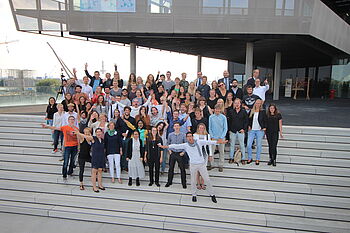
The First Baltic International Summer School 2015 (BISS) at the HCU in Hamburg will open up a continuous academic exchange between architects and engineers and present a broader perspective on education and practice in the context of related disciplines.
By using common resources in the Baltic Sea Region profit will be gained on several levels:
• academic benefit by exchange of knowledge
• cultural benefit by social and intellectual exchange
• personnel benefit by communication
• spatial benefit using „short cuts“ over the Baltic sea
• economic benefit developing synergies
The motto „think the link“ indicates the interdisciplinary approach searching for ties and correlation between experiences, cultures, cities and objects of the built environment.
The area east of Hamburg`s city centre, in particular around the infrastrucural joint „Elbbrücken“ will be the stage for the topic 2015 “at – over – on the water”. The project groups are asked to deal with water as both junction and quality as well as barrier and separation. Hereby we want to address not just a typical problem of Hamburg, but one that is characteristic for most harbour cities and thus the participants of the BISS. Within the project a wide range of disciplinary and thematic focusses shall be possible. Discovery and trial of methodology of the participating disciplines in their creative work will be background and source of the Summer School.
Every student will experience the iterative creative process and pass following phases:
focus - - - analysis - - - variance - - - discourse
Joint identification of the existing problems, examination of various methods and elaboration of possible solutions will strengthen the cross-functional competences of architects and engineers referring to their different academic and cultural background.
15.05.2015
submission of the application for participation
submission of the application for a scholarship
03.06.2015
notification of all selected participants
selection and notification of all scholarship recipients
10.06.2015
deadline for the transfer of the participation fee
The duration of the Summer School is 10 days.
Friday 21. 08. – Sunday 30. 08. 2015
The B.I.S.S. will take place in Hamburg at HafenCity University.
There will be a keynote lecture on Friday the 21th as well as a big final presentation and party on Saturday the 29th.
• Aalto University, Helsinki, Finland
• Chalmers University of Technology, Gothenburg, Sweden
• Royal Academy of Fine Arts Copenhagen, Denmark
• Technical University of Denmark, Copenhagen, Denmark
• Gdansk University of Technology, Gdansk, Poland
• Saint Petersburg State University of Architecture and Civil Engineering, Saint Petersburg, Russia
• ITMO University, Saint Petersburg, Russia
• HafenCity University Hamburg, Germany
Prospectively more universities from the Baltic Sea Region will join the B.I.S.S. in the future.
A continuous scientific, organizational and cultural exchange will be ensured by working in small interdisciplinary and international teams. Several formats are going to be applied:
- keynotes: Thematic impulses will be given by a number of well-known experts.
- mentoring system: The whole group of students will be divided in work groups of 10-16 students each
guided by one teacher. Within these groups, smaller working groups of 4 students will be constituted. - input: Regular inputs by one of the participating professors will open up a work day.
- group work: Students work on their project in groups of 4 following their own thematic focus.
Small excursions will complement the studies. - presentation: Presentations will be commented by a number of present experts.
- guest critics: Critics by external experts from different disciplines will promote the work flow.
- final public presentation: Guest from the press, the politics and local and international experts as well as participating teachers will comment the projects on Saturday the 29th. It will be open to the public and followed by a farewell party.
Furthermore a special social program will be organized, where participants from different countries and disciplines can meet and have a great time together. Including welcome reception, thematic city walk with a picnic in a park at the start and a farewell party at the end. The city tour, developed by HCU students will show the City, remarkable buildings and structures and give a good overview about Hamburg, the HafenCity and the University itself.
We are happy to present following lectures by inspiring protagonists and their individual point of view on the intersection of architecture and engineering.
HafenCity University . Hörsaal 200 . 6:30 pm
Fri . August 21
Neil Thomas . atelier one . www.atelierone.com
Sun . August 23 NN
Tue . August 25
Mike Schlaich . schlaich, bergermann und partner, Berlin
www.sbp.de
Hamburg`s University of the Built Environment has installed a network of researchers, teachers and students from the Baltic Sea Region. With this year`s focus „at - over - on the water“ 65 students from eight renowned universities create social and urban links of two of Hamburg`s most developing districts - HafenCity and Rothenburgsort. Hence links not only emerge between districts and cities but also between countries and cultures in the Baltic Sea Region. The results ranging from artistic to architectural and engineering concepts are presented to an invited audience at the Finissage in presence of the B.I.S.S. patroness Katharina Fegebank , Second Mayor of the City of Hamburg and Senator for Science, Research and Equalities.
closing event of the 1. B.I.S.S. on Saturday, August 29, 2015.
6:00 pm reception
welcome by the President of the HCU Dr.-Ing. Walter Pelka
and greetings from the B.I.S.S. patroness
Katharina Fegebank
Second Mayor of the City of Hamburg
and Senator for Science, Research and Equalities
as well as reflections of the Summer School by
Prof. Dr.-Ing. Annette Bögle
8:00 pm buffet on the terrace of the HCU
start of the unofficial framework programme
8:00 pm - 9:00 pm exhibition of the results
public tours led by B.I.S.S. supervisors
9:30 pm - 2:30 am party
with drinks and music
The participation at the Baltic International Summer School costs 300 Euro per external student, due on 10.06.2015.
The fee includes accomodation for ten nights, one daily meal as well as the workshop with guest lectures, course material and access to IT facilities. Furthermore, we will cover the costs of public transportation in Hamburg and a number of social activities during the whole Summer School. A contingency of rooms is reserved at the youth hostel.
Student workload at the B.I.S.S. including the preparation and documentation of the Summer School will be expressed in 5 ECTS credits. The workload will be ensured by the workshop in addition with preparation and postprocessing at the home universities. Besides the ECTS credits, students will be awarded a certificate of attendance for actively participating and successfully completing all assignments during the Baltic International Summer School.
Several info-sessions presenting the First Baltic International Summer School and its topics will be organized at the participating universities in early spring 2015.
For more information:
Sabrina Gieron | M.Sc. Architecture
sabrina.gieron(at)hcu-hamburg.de
+49 (0)40 | 42827-5234
Kristina Peselyte-Schneider | M.A.
kristina.peselyte(at)hcu-hamburg.de
+49 (0)40 | 42827-5236
Prof. Dr.-Ing. Annette Bögle
Design and Analysis of Structures
Civil Engineering | Architectural Engineering
annette.boegle(at)hcu-hamburg.de
if you have any questions you can contact either us or the responsible teacher at yout home university:
Aalto University, Helsinki | Toni Kotnik
Chalmers University, Gothenburg | Morten Lund
Royal Academy of Fine Arts, Copenhagen | Olga Popovic Larsen
Technical University of Denmark, Copenhagen | Lotte Bjerregård Jensen
Gdansk University of Technology, Gdansk | Bartosz Macikowski
Symposium Schnittstellen
Bauingenieure im Spiegel anderer Disziplinen
Die Tagung versammelt inter- und transdisziplinär arbeitende und forschende Tragwerksplaner, Architekten und Mathematiker. Im Fokus steht das Arbeiten der verschiedenen Disziplinen an den Schnittstellen zum Bauingenieurwesen mit dem Ziel, das dort generierte Wissen auf seine Anschlussfähigkeit und seine Auswirkungen für die Kerntätigkeit des Tragwerkplaners – das Entwerfen – zu erfassen und zu evaluieren.
Über die Schnittstellen im Bauingenieurwesen sprechen:
Keynote am 29. Januar 2015:
- Jan Knippers | Universität Stuttgart • Knippers Helbig Advanced Engineering
Tagung am 30. Januar 2015:
- Toni Kotnik | SUTD Singapore
- Julian Lienhard | str.ucture GmbH
- Karen Eisenloffel | BTU Cottbus • EISAT Ingenieure
- Matthias Michel | Imagine Structure
- Oliver Tessmann | KTH Stockholm • TU Darmstadt
- Christoph Gengnagel | UdK Berlin • Bollinger und Grohmann
- Andreas Trummer | TU Graz
- Wolf Mangelsdorf | BuroHappold London
- Simon Vogt | transform engineers
Moderiert wird die Tagung von Annette Bögle, Sabine Kühnast und Gesa Ziemer. Die Tagung wird organisiert von dem Fachgebiet Entwurf und Analyse von Tragwerken Prof. Dr.-Ing. Annette Bögle (HCU Hamburg).
Key Note: Donnerstag, 29. Januar 2015, 18.30 Uhr
Symposium: Freitag, 30. Januar 2015, 9.00-18 Uhr
Ort: Holcim Auditorium, Hafen City Universität Hamburg, Überseeallee 16, 20457 Hamburg
